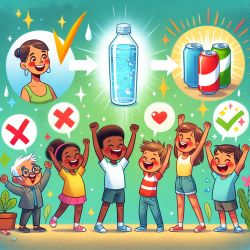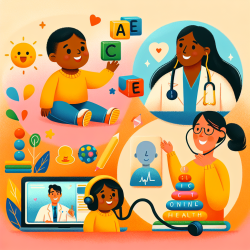The Power of Water: A Simple Step for Better Health Outcomes in Children
As practitioners in the field of speech-language pathology, we are deeply committed to improving the health and well-being of children. A recent study titled “Your Body Feels Better When You Drink Water”: Parent and School-Age Children’s Sugar-Sweetened Beverage Cognitions provides compelling insights into the consumption of sugar-sweetened beverages (SSBs) and their impact on children's health. This research underscores the importance of reducing SSB intake and offers strategies that practitioners can implement to foster healthier habits among children.
Understanding the Impact of SSBs
SSBs are a leading source of added sugars in the American diet, contributing significantly to childhood obesity, dental issues, and metabolic disorders. The study highlights that both parents and children recognize the negative health effects of excessive SSB consumption, yet many struggle to limit intake due to various barriers.
Key Findings and Implications for Practice
- Parental Influence: Children often model their parents' behaviors. The study found that when parents consume SSBs, children are more likely to do the same. Encouraging parents to model healthier behaviors by choosing water or milk can significantly reduce children's SSB intake.
- Environmental Control: Keeping SSBs out of the home and promoting water and milk as primary beverage options are effective strategies. Practitioners can advise parents to create an environment where healthier choices are readily available.
- Education and Awareness: Both parents and children benefit from understanding the health implications of SSBs. Practitioners can provide educational resources that highlight the benefits of water and the risks associated with sugary drinks.
Strategies for Practitioners
Practitioners can play a pivotal role in reducing SSB consumption by incorporating the following strategies into their practice:
- Parental Workshops: Organize workshops to educate parents about the impact of SSBs and the importance of modeling healthy behaviors.
- Collaborative Efforts: Work with schools to ensure that healthier beverage options are available and promoted during school activities.
- Resource Development: Create and distribute materials that provide practical tips for reducing SSB intake and increasing water consumption.
Encouraging Further Research
While this study provides valuable insights, further research is needed to explore the long-term effects of reduced SSB consumption on children's health. Practitioners are encouraged to stay informed about ongoing research and incorporate evidence-based strategies into their practice.
To read the original research paper, please follow this link: “Your Body Feels Better When You Drink Water”: Parent and School-Age Children’s Sugar-Sweetened Beverage Cognitions.










